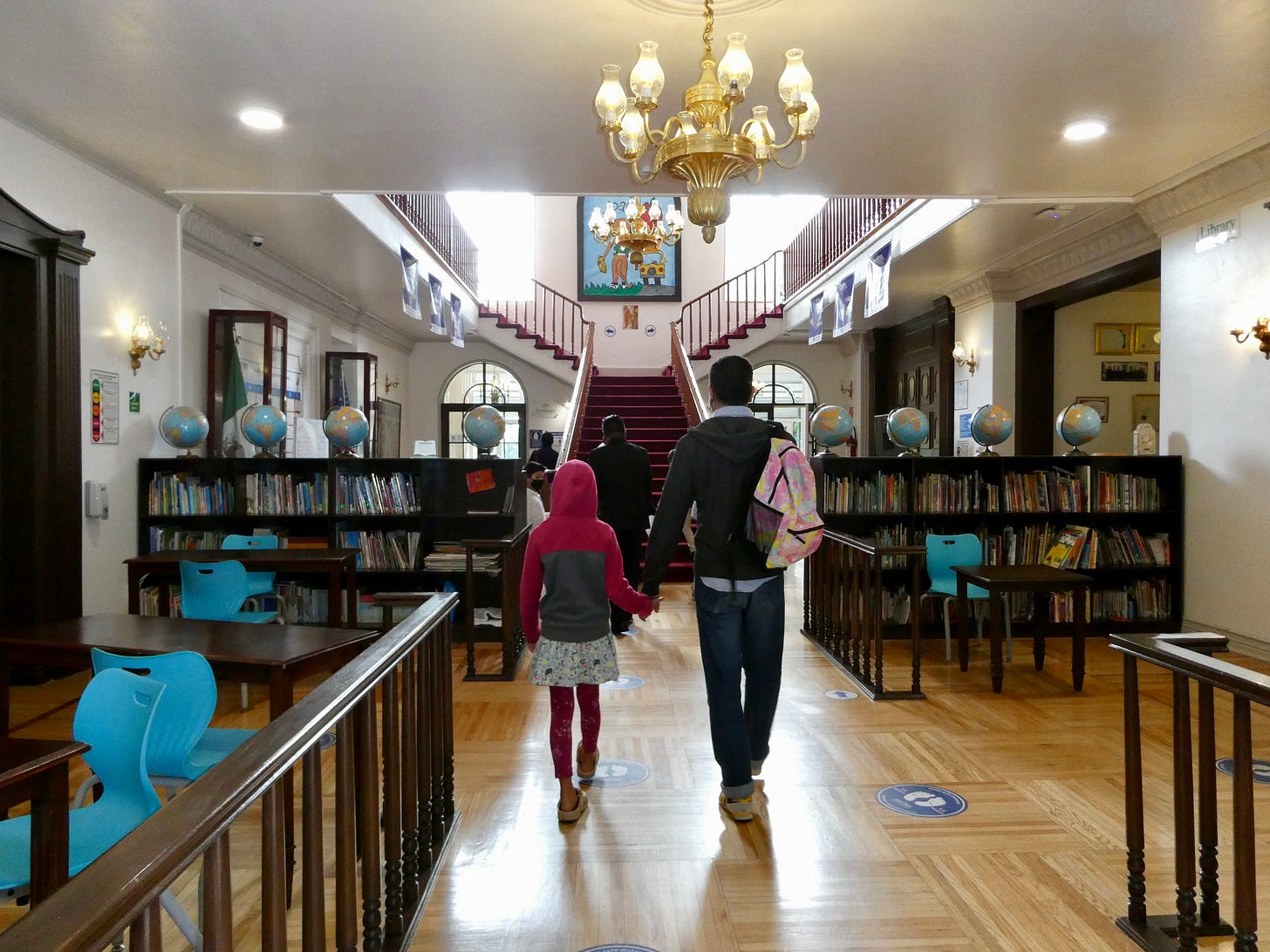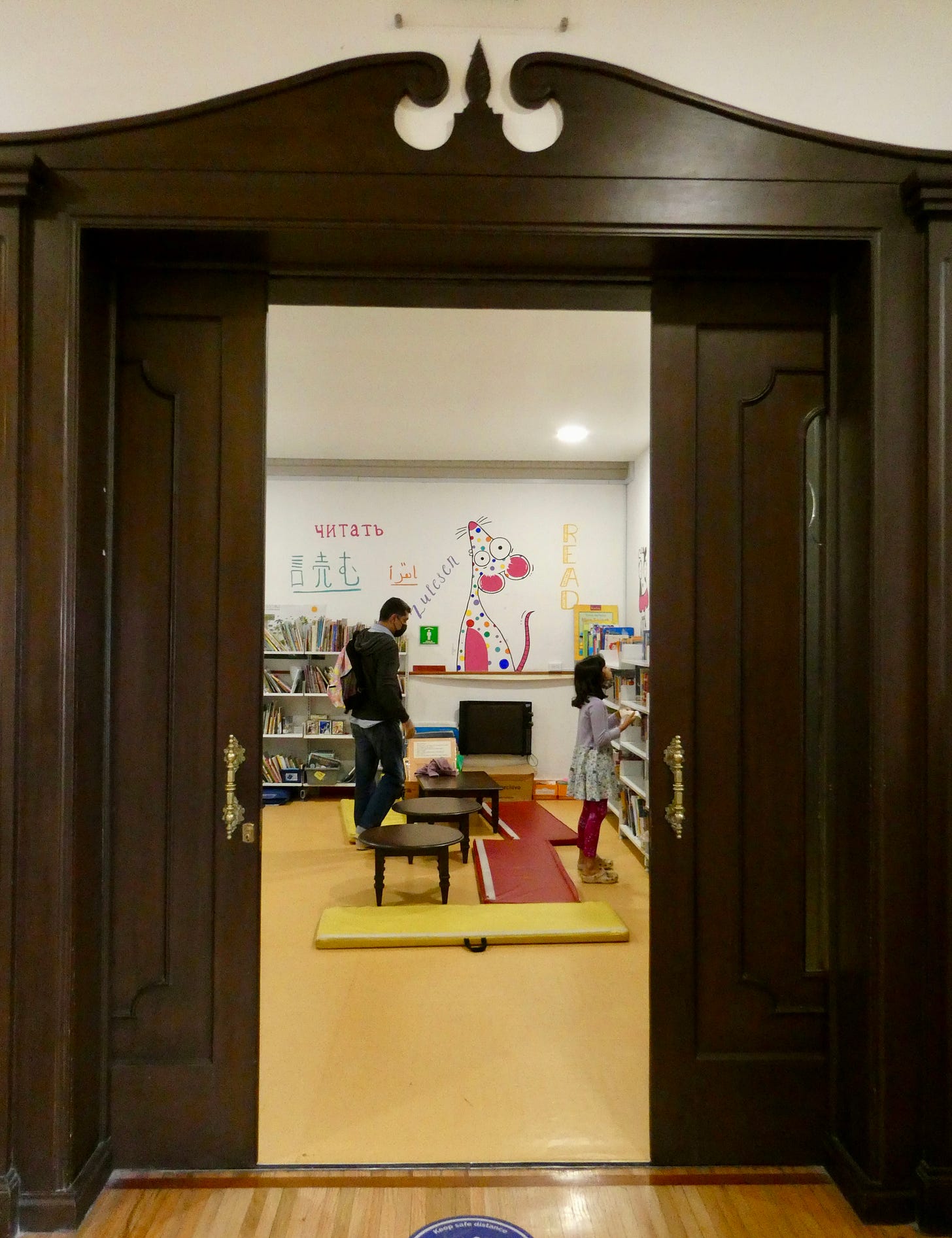Finding the just-right school
Structure, independence, and labels
Hello, friends.
This week we are in Mexico City, to visit some schools and think about our next steps for 2023. I find that having to make decisions on next schools and next locations is forcing me to reflect consciously and regularly about what kind of learning environment might work best for Beanie, and for us.
It’s possible we will choose to stay in Costa Rica beyond this semester. That wasn’t the plan when we came here, but so far TIDE Academy has overall been a positive experience for Beanie, so now that option is on the table. Still, for me, staying would feel a bit like a lost opportunity to use this nomadic freedom to experiment more radically than we otherwise would. Even if we ultimately decide to extend our stay, the exploration of what else is out there and what we value most is probably a useful exercise, and one that we wouldn’t revisit as systematically in our lives at home.
The schools we’ve chatted with recently are more traditional and structured private schools. Students wear uniforms with little blazers and matching socks. In contrast, our TIDE parent newsletter states: “Beginning October 3rd our dress code will come into effect. All students must be wearing TIDE tee shirts except for Kindergarten students. Although many come without shoes, we do recommend them.” Ha! I love the strict TIDE dress code.
We ended up in Costa Rica because we happened to visit a school while on vacation here in 2019, and we liked it. That we are there feels like both a fluke and singularly purposeful. Sometimes as I’m driving around or shopping for eggs and granola, I am still surprised that I “live” there. And as I’m hopping about online, Googling here and there, where we’ll be shopping for eggs and granola next again feels almost arbitrary; at the same time we are choosing our next location based on finding a good-fit school, which is as targeted a goal as any.
We’re seeing two international schools in Mexico City, both with an almost even split of foreign and Mexican families. We were curious about how much the students from each group play together, and we’ve been told that they mix very well. That’s a plus—it would be great for Beanie to make friends with local children and not just foreigners. The foreign students are also from 30 or 40 countries all over the world. Much as we like TIDE, almost all the students are from Canada or the US.
(As I write this, we’ve just made a visit to the first school. It was a beautiful school in a beautiful, leafy neighborhood. The building looked like something out of Hogwarts, Taz remarked. The visit was not entirely successful, however. More on that next time.)
We’ve also spoken to the principal of a small school for gifted children in British Columbia and while it sounds promising, we aren’t completely convinced yet that a school of only gifted students would be the right environment for Beanie. For one thing, some students are exceptionally talented in one area—chess, music, and so on—and in that way they are gifted. So far, Beanie has shown herself to be gifted in the sense that she’s a sharp thinker and fast learner. She loves doing logic and lateral thinking puzzles. But she hasn’t yet demonstrated prodigy in any one area. For children like her, does it help to put a “gifted” label on her?
Earlier this year, Taz and I watched Try Harder!, the documentary about Lowell High School in San Francisco, a public school well-known in the Bay Area for its academic excellence. The film left us reeling over the pressures the students are under—the pressure they put themselves under—to get into the best universities in the US. That, we told each other emphatically, was not what we want for Beanie—not the single-minded pursuit of this one looming goal, given so much weight that it can only seem like the be-all and end-all.
Would going to a school for the gifted bring that same kind of intense competition and make her feel bad about not having one special talent? Or would it challenge her in a healthy way, perhaps bring out latent talents and push her to go further than she would in a more relaxed environment?
I’ve always prioritized Beanie’s mental and social well-being over academic achievement or even finding her gifts. It’s most important to me that she grow up well-adjusted and resilient. This has been my mindset since Beanie started preschool and it still stands. I’m also a believer in learner-driven education, nurturing children’s natural curiosity and giving them the tools to develop a love of learning.
Now that Beanie is older, though, and we know she is capable of excelling academically, I’m coming around to the possibility that she might need some nudging to develop the discipline and drive that will help her fulfill her potential. I’m still unsure where the line is between nudging her enough to thrive and be her best self, yet not so much that she ends up working just for the grade and to chase paper. I feel fortunate that we have this opportunity to explore and try to calibrate where that line might be.
There probably doesn’t exist a just-right school, or at least not a just-right school that will be just-right all the way from now through high school. As Beanie grows, her needs will change; we’ll have to stay vigilant and hopefully be in a position to respond and adjust.
In the course of looking for documents to send to the gifted school, I came across the credo and mission statement that our family sat down and wrote together at the beginning of the Acton Academy Concord school year in 2021. The school asks every family to create their own guiding statement, and we found it a useful exercise in thinking through what our little family unit values and would like to work toward together.
Here is what we came up with:
LIAW-SUNDERJI FAMILY CREDO
Do the next right thing.
Our Family Mission
Our family mission is to love one another, support one another’s dreams, and face life together with humor.
We Believe
We believe we have a responsibility to our fellow humans, whether they live 10 or 10,000 miles from us.
We believe in personal accountability.
We believe a sense of humor is more than just having a laugh—it is essential to a positive perspective and making the most of life.
We believe every human has the right to fulfill their potential.
We believe in education and that learning doesn’t stop when you leave school.
Who Liaw-Sunderjis Are
We are goofy and love to laugh.
We are curious and want to learn all our lives.
We love to explore, wander and travel.
We are community-minded.
We are generous.
We are creative and we like to be problem-solvers.
We take care of our extended family.
It took us a bit of brainstorming to define who we are, and then distill that into the credo of “Do the next right thing,” which Disney buffs will recognize as a song from Frozen 2—at the time, one of Beanie’s and Taz’s favorite films (another of Taz’s favorite movies is Heat with Al Pacino and Robert de Niro…he contains multitudes).
As we move through this experience of exploring different schools, we are trying to stay true to the values we espoused in our statement: we believe every human (including ourselves) has the right to fulfill their potential; we believe that learning isn’t confined to school; we believe we have a responsibility to other people near and far. In the last case, I hope that the privilege of traveling and interacting with people from very different circumstances will make the world smaller for Beanie, and distant lands much less distant.
As I’m writing this, it occurs to me that given our mobility this year, we have more leeway to experiment and take bigger risks. We can try schools and if they don’t work out, we’ll know they are not the right learning environment for Beanie, at least for now. So it makes me lean more toward giving something quite different, like a school for the gifted, a shot. I haven’t synthesized that thought into a conclusion yet, but rather as a factor in our decision-making.
As we were walking back from the grocery store this evening, we saw three species of birds flocking together. I recognized the pigeons, of course (are pigeons in every city in the world?? It seems so…Update: I looked it up, and they exist in the cities of every continent except Antarctica). I wasn’t sure if the second bird was a swallow, or what the third species was at all. I asked Beanie who, after forest school and a lot of time in nature, is more knowledgable about these things than I am. Yes, the second species was a swallow and the third was a type of dove, she said. And I’m reminded once again that she has already learned so much, not always from books and the classroom, and I am glad for it.
Pretty Good Things
Writing a Family Credo
Acton Academy’s family assignment, to create a credo and mission statement in the same way an organization might, helped us to coalesce and articulate our beliefs. Just the process of sitting down together and hashing it out was productive. I would recommend this exercise for other families.
Try Harder!
Try Harder! is the documentary I mentioned above, about Lowell High School students and their quest to get into elite colleges. I felt for these young people and I was glad to not be applying for colleges in this day and age. The documentary—good but nail-biting—can be found on Hulu.
Science Fair
You don’t have to have an interest in science fairs or science to appreciate this film that follows nine young scientists as they prepare to compete in the massive and prestigious Intel International Science and Engineering Fair. I really rooted for these kids, and came away in awe and feeling good about the next generation. Also, there is a featured teacher who really drives home the difference a dedicated educator can make in so many students’ lives. Science Fair is streaming on Disney+ and can be rented elsewhere.





Another interesting read, thank you for sharing your adventures Jane! Please tell Beanie hello from all of us at Acton Academy Concord. I look forward to your next post.